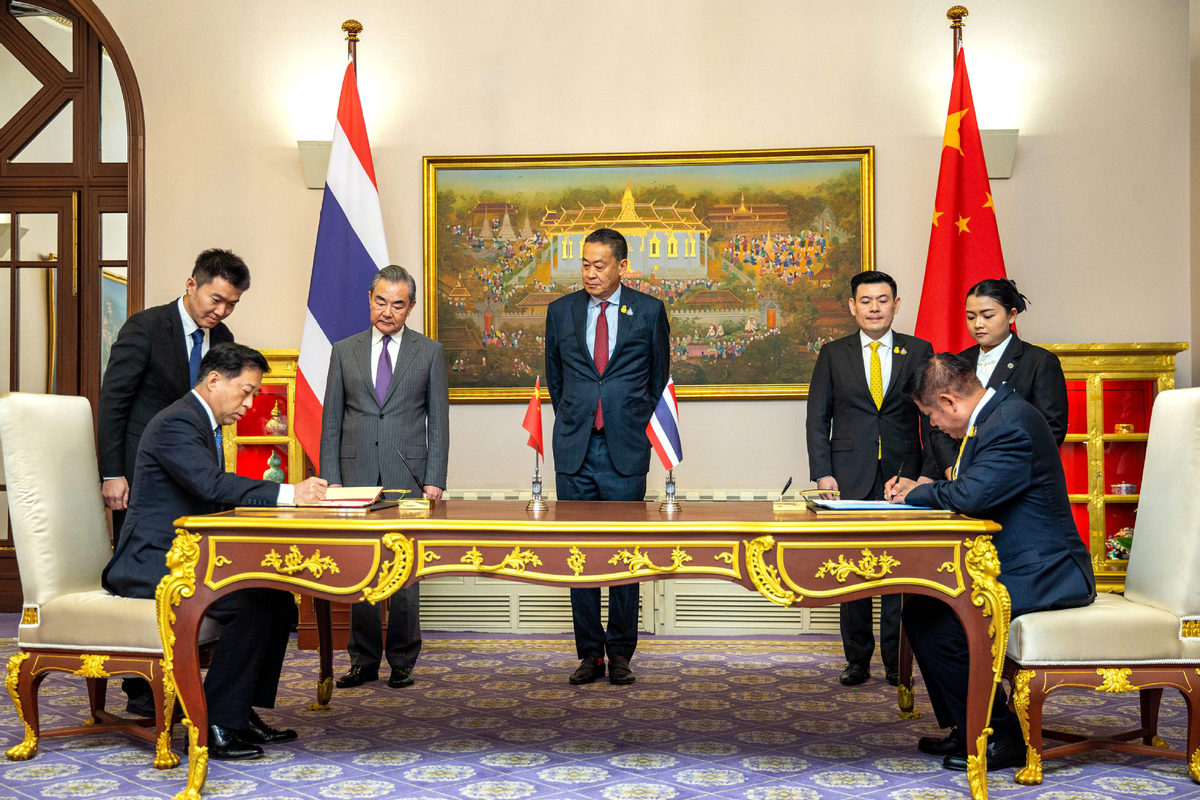Sino-Thai friendship to boost development
- YANG WANLI
 0 Comment(s)
0 Comment(s) Print
Print E-mail CHINA DAILY/XINHUA, January 30, 2024
E-mail CHINA DAILY/XINHUA, January 30, 2024

Thai Prime Minister Srettha Thavisin (center) and Chinese Foreign Minister Wang Yi (third from left), also a member of the Political Bureau of the Communist Party of China Central Committee, jointly attend a ceremony held in Bangkok on Monday for signing an agreement for the export of Thai agricultural products to China. WANG TENG/XINHUA
Strengthened friendship and deepened cooperation between China and Thailand will further contribute to regional peace, stability and development, said Chinese Foreign Minister Wang Yi on Monday while meeting Thai Prime Minister Srettha Thavisin in Bangkok.
Wang, also a member of the Political Bureau of the Communist Party of China Central Committee, noted that China always sees Thailand as a priority in its diplomacy with neighboring countries and also appreciates the kingdom's contribution to peace and development in the region as well as the world.
He said Srettha's decision to make China the first country outside the Association of Southeast Asian Nations for an official visit after assuming office last year fully reflects the great importance that Thailand attaches to its relations with China, and has brought the traditional friendship even closer while deepening the long-standing tradition that "Chinese and Thais are of one family".
"To join hands and accelerate the building of a community with a shared future for mankind will also bring a brighter future to the world," he said, adding that China will further boost tourism and continue to deepen trade and investment with Thailand.
Wang also called for speeding up the construction of China-Thailand Railway, expressing expectations on the future of regional development under the improved connectivity.
As China and Thailand are comprehensive strategic cooperative partners, the strengthening of mutual trust and mutually beneficial cooperation between them would provide further guarantee of peace in Asia and impetus for regional development, said Wang.
During the meeting, Srettha stressed Thailand's firm commitment to the one-China principle.
Referring to the mutual visa exemption agreement signed between the two countries on Sunday, Srettha said the pact will boost people-to-people exchanges and friendship between China and Thailand. "Thailand and China are one family and the mutual visa exemption will bring the ties even closer."
High-level exchanges
As for celebrating the 50th anniversary of China-Thailand diplomatic relations next year, he said plans could be made in advance to maintain high-level exchanges and close cooperation in various fields for greater development of bilateral relations.
Wang said China stands ready to maintain high-level exchanges with the Thai side, carry out closer people-to-people exchanges, and take the comprehensive strategic cooperative partnership between the two countries to a new level while looking forward to celebrations next year.
During the meeting at the Government House on Monday, two documents on the export of Thai agricultural products to China were also signed.
Wang paid an official visit to Thailand from Friday to Monday. During the visit, he also met Princess Maha Chakri Sirindhorn of Thailand for the annual consultation, in which both sides reached important consensus on deepening the China-Thailand community with a shared future.
He said Princess Sirindhorn is Chinese people's good and old friend, and has been awarded the Medal of Friendship, adding that she has visited China more than 50 times, facilitating deeper mutual understanding between the two peoples, and becoming a symbol of Sino-Thai friendship.
On Sunday, Wang and Parnpree Bahiddha-Nukara, deputy prime minister and minister of foreign affairs of Thailand, co-chaired the first meeting of the consultation mechanism between the ministers of foreign affairs of Thailand and China.
The meeting also discussed ways to further promote cooperation in various fields, including trade, investment, culture, tourism, people-to-people contact, connectivity facilitation, and security issues.
Xinhua contributed to the story.


